A BS in health science jobs sets the stage for a diverse and rewarding career path, offering a foundation for a wide range of professions within the healthcare field. This degree equips graduates with the essential knowledge and skills to excel in roles that contribute to the well-being of individuals and communities.
From research and clinical practice to administration and public health, a BS in health science opens doors to various industries and specializations. Graduates can find fulfilling careers in hospitals, clinics, research institutions, government agencies, and private organizations. The demand for qualified health science professionals is consistently high, ensuring a stable and promising job market.
Overview of Health Science Careers
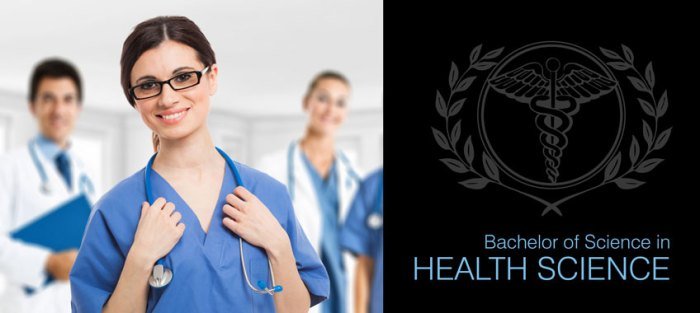
The health science field encompasses a vast array of professions, each playing a crucial role in promoting health and well-being. From clinical care to research and public health, health science careers offer diverse opportunities for individuals passionate about making a difference in people’s lives.A Bachelor of Science in Health Science degree serves as a foundational stepping stone for many of these careers.
This degree equips individuals with a comprehensive understanding of the healthcare system, biological and physiological principles, and the social and ethical considerations surrounding health. It provides a solid base of knowledge and skills that are essential for success in a variety of health science roles.
Examples of Health Science Careers
A Bachelor of Science in Health Science degree can open doors to various career paths within the health science field. Here are some examples of specific job titles, their typical duties, and responsibilities:
Health Educator
Health educators promote health and prevent disease through education and community outreach. They develop and implement health education programs, conduct health assessments, and provide counseling and support to individuals and communities. They may work in hospitals, schools, community centers, or government agencies.
Public Health Professional
Public health professionals work to protect and improve the health of populations. They analyze health data, identify health risks, develop and implement public health programs, and advocate for policies that promote health equity. They may work in government agencies, non-profit organizations, or research institutions.
Medical Assistant
Medical assistants provide administrative and clinical support to physicians and other healthcare professionals. They perform tasks such as taking patient histories, vital signs, and assisting with examinations. They may also handle scheduling, billing, and other administrative duties.
Health Information Technician
Health information technicians manage and maintain health records. They ensure the accuracy and completeness of patient data, process health information for billing and insurance purposes, and assist with data analysis and reporting. They may work in hospitals, clinics, or insurance companies.
Research Assistant
Research assistants assist with the design, implementation, and analysis of research studies in the health science field. They collect data, analyze results, and write reports. They may work in academic institutions, research hospitals, or pharmaceutical companies.
Healthcare Administrator
Healthcare administrators manage the operations of healthcare organizations. They oversee budgets, staffing, and facilities, and ensure compliance with regulations. They may work in hospitals, clinics, or nursing homes.
Rehabilitation Counselor
Rehabilitation counselors work with individuals with disabilities to help them achieve their goals and live fulfilling lives. They assess clients’ needs, develop rehabilitation plans, and provide counseling and support services.
A BS in health science can open doors to a wide range of career paths, from research to healthcare administration. One area of focus in health science is nutrition, and understanding the benefits of different foods can be incredibly valuable.
For example, eggplant, a versatile vegetable, offers a variety of health benefits, as detailed in this article on benefits of eggplant for health. Armed with a solid foundation in health science and knowledge about healthy eating habits, you can make a real difference in people’s lives.
Health Policy Analyst
Health policy analysts research and analyze health policies and regulations. They identify policy issues, evaluate the effectiveness of existing policies, and recommend policy changes. They may work in government agencies, think tanks, or research institutions.
Health Services Manager
Health services managers plan, direct, and coordinate the delivery of healthcare services. They oversee budgets, staffing, and facilities, and ensure the quality and efficiency of healthcare delivery. They may work in hospitals, clinics, or nursing homes.
Dietician
Dieticians provide nutritional counseling and education to individuals and groups. They assess nutritional needs, develop personalized meal plans, and educate clients on healthy eating habits. They may work in hospitals, clinics, schools, or community centers.
Career Paths with a BS in Health Science

A Bachelor of Science in Health Science (BSHS) degree provides a broad foundation in the principles of health, wellness, and disease prevention. This versatile degree prepares graduates for a wide range of careers in the healthcare industry and related fields.The BSHS curriculum typically covers topics such as human anatomy and physiology, health psychology, public health, health policy, and research methods.
This comprehensive education equips graduates with the knowledge and skills necessary to succeed in various roles.
Industries that Hire Health Science Graduates
A BSHS degree opens doors to diverse industries, including:
- Healthcare:Hospitals, clinics, medical centers, and other healthcare facilities employ health science graduates in various roles such as patient care coordinators, health educators, and research assistants.
- Public Health:Government agencies, non-profit organizations, and community health centers hire health science graduates to promote public health initiatives, conduct health outreach programs, and analyze health data.
- Pharmaceuticals and Biotechnology:Pharmaceutical companies and biotechnology firms employ health science graduates in roles such as clinical research coordinators, regulatory affairs specialists, and medical writers.
- Insurance:Health insurance companies hire health science graduates to evaluate medical claims, manage risk, and develop health plans.
- Education:Colleges and universities employ health science graduates as instructors, researchers, and administrators.
Career Advancement and Specialization
A BSHS degree serves as a stepping stone for career advancement and specialization. Graduates can pursue further education, such as a Master’s degree or a Doctorate, to enhance their knowledge and skills. This can lead to more specialized roles, higher salaries, and greater career opportunities.
- Master’s Degrees:A Master’s degree in a health science-related field, such as public health, health administration, or health education, can lead to advanced positions in research, management, or policy development.
- Doctorate Degrees:A Doctorate in a health science field, such as a PhD in Epidemiology or a Doctor of Public Health (DrPH), can qualify graduates for research positions, teaching roles, or leadership positions in public health agencies.
- Professional Certifications:Obtaining professional certifications, such as Certified Health Education Specialist (CHES) or Certified Public Health Professional (CPH), can demonstrate expertise and enhance career prospects.
Essential Skills and Knowledge
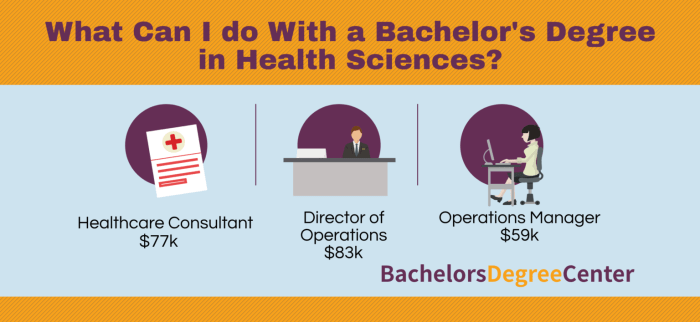
A Bachelor of Science in Health Science equips individuals with a broad understanding of the healthcare system and the skills necessary to succeed in various roles. This degree provides a solid foundation in the sciences, along with crucial soft skills that are highly valued in the healthcare field.
Critical Thinking, Problem-Solving, and Communication
These skills are essential for navigating the complexities of the healthcare system and effectively interacting with patients, colleagues, and other stakeholders.
- Critical thinkingenables healthcare professionals to analyze complex situations, evaluate evidence, and make informed decisions. This skill is crucial for diagnosing illnesses, developing treatment plans, and ensuring patient safety.
- Problem-solvinginvolves identifying issues, developing solutions, and implementing them effectively. In healthcare, this skill is used to address patient needs, manage emergencies, and improve healthcare delivery systems.
- Communication skillsare vital for building rapport with patients, explaining medical procedures, and collaborating with other healthcare professionals. Effective communication helps ensure patient understanding, adherence to treatment plans, and positive patient outcomes.
Technical Skills and Scientific Knowledge
The specific technical skills and scientific knowledge required vary depending on the chosen career path. However, a strong foundation in biology, chemistry, anatomy, and physiology is essential for most health science roles.
- Medical terminologyis essential for understanding medical records, communicating with healthcare professionals, and providing accurate patient care. A strong understanding of medical terminology enables healthcare professionals to effectively interpret and use medical information.
- Data analysisis increasingly important in healthcare, as large datasets are collected and analyzed to improve patient care, track disease trends, and develop new treatments. Individuals with a BS in Health Science are equipped to analyze and interpret this data.
- Research methodsare essential for conducting and interpreting research studies. This knowledge is valuable for healthcare professionals who want to contribute to advancements in medical knowledge and practice.
Job Market Trends and Outlook
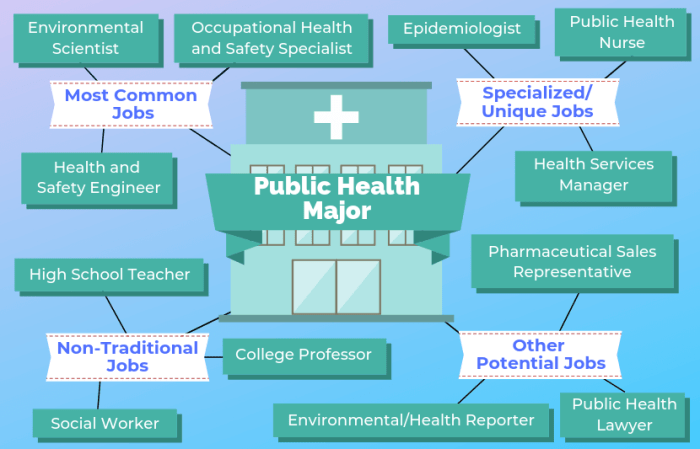
The health science field is experiencing significant growth, driven by factors like an aging population, increasing prevalence of chronic diseases, and advancements in medical technology. This growth translates into a robust job market for health science professionals, offering diverse career opportunities and promising future prospects.
Impact of Emerging Technologies and Healthcare Advancements
Emerging technologies and healthcare advancements are revolutionizing the health science landscape, creating new job roles and transforming existing ones. These advancements are driving innovation in areas like diagnostics, treatment, and patient care, leading to a dynamic and evolving job market.
- Artificial intelligence (AI) and machine learning (ML)are transforming healthcare by automating tasks, improving diagnostics, and personalizing treatment plans. This creates demand for professionals skilled in AI and ML, including data scientists, bioinformaticians, and AI-enabled healthcare specialists.
- Telehealth and virtual careare becoming increasingly popular, offering convenient and accessible healthcare services. This trend is creating new roles for telehealth coordinators, virtual care providers, and remote patient monitoring specialists.
- Genomics and personalized medicineare allowing for tailored treatments based on individual genetic profiles. This creates demand for professionals with expertise in genetics, genomics, and personalized medicine, including genetic counselors, pharmacogenomics specialists, and precision medicine researchers.
- Biotechnology and bioengineeringare advancing rapidly, leading to breakthroughs in drug development, gene therapy, and regenerative medicine. This creates opportunities for professionals in biotechnology research, bioengineering, and clinical trials.
Education and Training Requirements
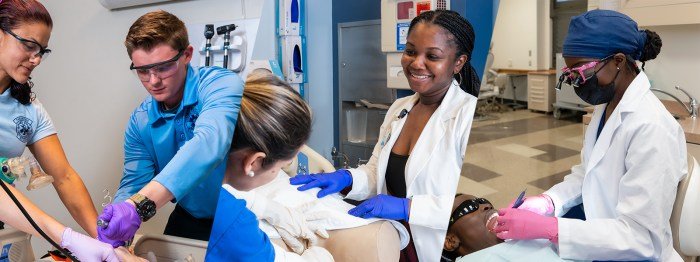
A Bachelor of Science in Health Science (BS in Health Science) degree serves as a strong foundation for a wide range of healthcare careers. The typical educational pathway involves a combination of classroom learning, hands-on experience, and specialized training.
Typical Educational Pathways
The typical educational pathway for health science careers involves completing a four-year undergraduate degree program in health science, followed by specialized training, such as a master’s degree or a professional certification.
- Undergraduate Degree:A BS in Health Science provides a broad understanding of healthcare concepts, including biology, anatomy, physiology, public health, and healthcare policy. The curriculum typically includes coursework in research methods, statistics, and communication skills.
- Graduate Programs:Depending on the desired career path, individuals may pursue a master’s degree or a professional doctorate in a specific health science field. These programs provide advanced knowledge and skills in specialized areas, such as public health, healthcare administration, or clinical research.
- Specialized Training:Many health science careers require additional specialized training, such as certifications or licensures. These programs may be offered by professional organizations or educational institutions.
Role of Internships and Practical Experience
Internships and practical experience are essential for gaining professional skills and building a network in the healthcare field. These opportunities allow students to apply their classroom knowledge in real-world settings and develop valuable hands-on experience.
- Gaining Hands-on Experience:Internships provide students with the opportunity to work alongside experienced professionals, learn practical skills, and gain exposure to different aspects of the healthcare system.
- Developing Professional Skills:Internships foster the development of essential professional skills, such as communication, teamwork, problem-solving, and critical thinking.
- Networking Opportunities:Internships provide students with the chance to network with healthcare professionals and build connections that can lead to future job opportunities.
Certifications and Licensures
Many health science careers require specific certifications and licensures to practice legally. These credentials demonstrate competency and ensure that professionals meet established standards of practice.
A Bachelor of Science in Health Science opens doors to a wide range of career paths, from clinical research to health education. If you’re passionate about fitness and wellness, consider exploring opportunities at a place like Life Time Fitness Chicago , where you can gain valuable experience in a dynamic fitness environment.
This could be a great stepping stone to a fulfilling career in the health and wellness field.
- Registered Nurse (RN):Nurses must pass the National Council Licensure Examination (NCLEX-RN) to become registered nurses.
- Physician Assistant (PA):PAs must graduate from an accredited PA program and pass the Physician Assistant National Certifying Examination (PANCE).
- Medical Technologist:Medical technologists must earn a bachelor’s degree in medical technology and pass the American Society for Clinical Pathology (ASCP) Board of Certification exam.
Salaries and Compensation: Bs In Health Science Jobs
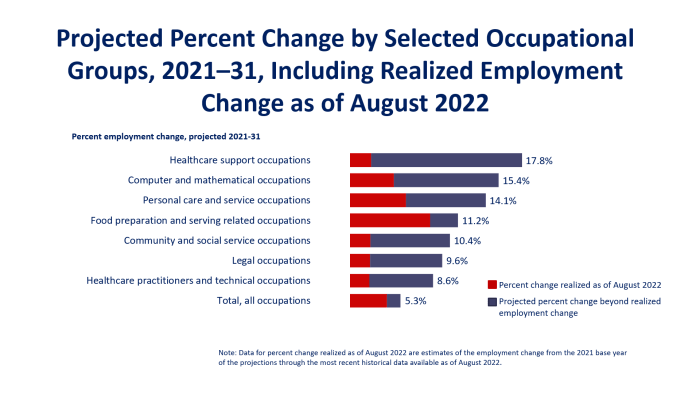
A career in health science can be financially rewarding, with salaries varying depending on the specific job, experience, location, and employer. The average salary for health science professionals is influenced by a variety of factors, including education, experience, and specialization.
Average Salary Range for Various Health Science Jobs
The average salary range for various health science jobs can vary significantly. Here are some examples of common health science jobs and their associated salary ranges:
- Medical Assistants:$35,000 – $50,000 per year
- Registered Nurses:$60,000 – $85,000 per year
- Physical Therapists:$70,000 – $95,000 per year
- Health Educators:$45,000 – $65,000 per year
- Public Health Analysts:$55,000 – $80,000 per year
Salary Comparison Across Different Industries and Geographical Locations
Salaries for health science professionals can vary significantly depending on the industry and geographical location. For example, health science professionals working in hospitals typically earn higher salaries than those working in private practices or non-profit organizations. Additionally, salaries tend to be higher in major metropolitan areas compared to rural areas.
Factors That Influence Salary Levels
Several factors can influence salary levels for health science professionals, including:
- Experience:More experienced professionals typically earn higher salaries than those with less experience.
- Education:Professionals with advanced degrees, such as a Master’s or Doctorate, generally earn higher salaries than those with a Bachelor’s degree.
- Specialization:Highly specialized health science professionals, such as surgeons or cardiologists, typically earn higher salaries than those with more general skills.
- Location:Salaries for health science professionals tend to be higher in major metropolitan areas compared to rural areas.
- Employer:Salaries can vary depending on the type of employer, such as a hospital, private practice, or government agency.
It is important to note that these are just general estimates and actual salaries may vary depending on individual circumstances.
Networking and Professional Development
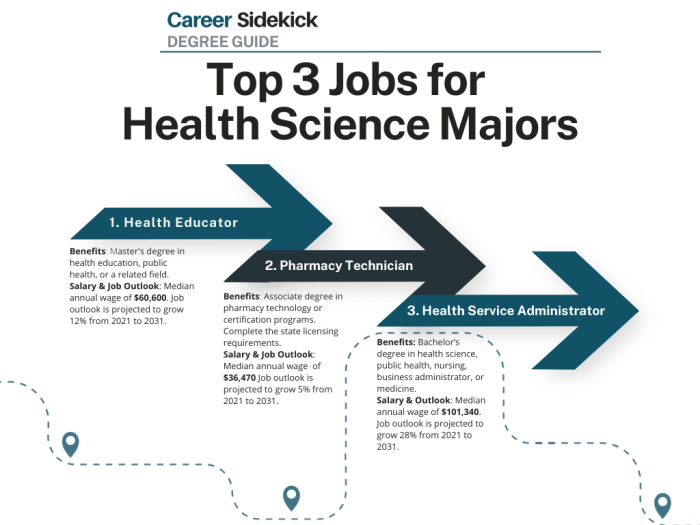
Networking and professional development are crucial for career advancement in the health science field. Building strong relationships with professionals in your field can open doors to new opportunities, enhance your knowledge, and provide valuable insights into industry trends.
A BS in Health Science opens doors to a variety of roles in the healthcare field, from administrative positions to patient care. If you’re interested in urgent care, you might consider exploring opportunities at Christus Health Urgent Care , a reputable provider known for its commitment to patient well-being.
With a strong foundation in health science, you’ll be well-equipped to navigate the dynamic world of urgent care and contribute to a positive patient experience.
Professional Organizations and Conferences, Bs in health science jobs
Professional organizations offer numerous benefits to health science professionals, including networking opportunities, access to industry resources, and opportunities for continuing education. These organizations provide a platform for professionals to connect with peers, share knowledge, and stay abreast of the latest advancements in the field.
- Joining professional organizations can connect you with a network of individuals who share your interests and goals. Attending conferences organized by these organizations provides an opportunity to learn from experts, network with colleagues, and explore potential career paths.
- Many organizations offer online forums and discussion groups where members can engage in conversations and exchange information on various topics related to their profession.
- Professional organizations often publish journals, newsletters, and other resources that keep members informed about industry trends, research findings, and best practices.
Opportunities for Ongoing Education and Professional Development
The health science field is constantly evolving, making it essential to engage in ongoing education and professional development. This can include pursuing advanced degrees, attending workshops and seminars, or obtaining certifications.
- Pursuing a master’s or doctoral degree can enhance your knowledge and skills, opening doors to more advanced roles and leadership opportunities.
- Workshops and seminars provide focused training on specific topics, allowing you to stay updated on the latest advancements in your area of expertise.
- Obtaining certifications can demonstrate your expertise in a particular area, making you more competitive in the job market.
Outcome Summary

Earning a BS in health science is an investment in a future filled with purpose and potential. By pursuing this degree, individuals gain a comprehensive understanding of healthcare systems, develop critical thinking and problem-solving skills, and contribute to improving the health and well-being of others.
With a solid foundation in health science, graduates are well-equipped to navigate the dynamic healthcare landscape and make a meaningful impact on society.
FAQ Resource
What are the most common health science jobs?
Some of the most common health science jobs include registered nurses, medical assistants, health educators, public health specialists, and research assistants.
What is the average salary for a BS in health science graduate?
The average salary for a BS in health science graduate varies depending on the specific job role, experience, and location. However, many health science jobs offer competitive salaries and benefits.
Is a BS in health science a good choice for a career?
A BS in health science is an excellent choice for those interested in a career in the healthcare field. It provides a strong foundation for a variety of roles and offers opportunities for growth and advancement.
What are some of the challenges of working in health science?
Working in health science can be demanding and challenging, requiring long hours, stressful situations, and the ability to handle sensitive information. However, the rewards of making a difference in people’s lives are significant.